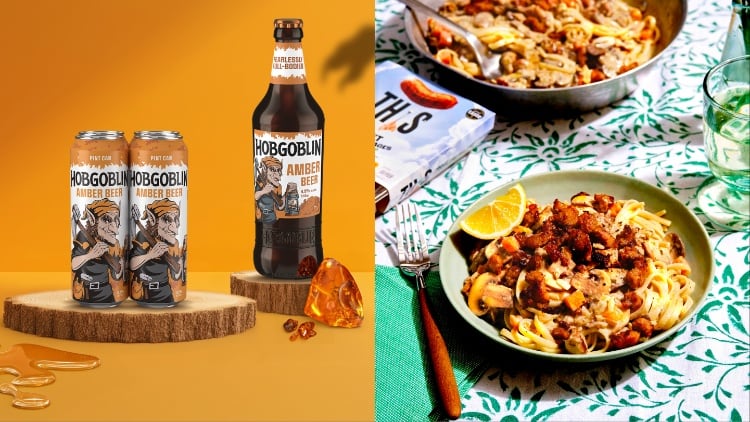There are few foods more synonymous with Easter than chocolate eggs, with the average UK adult set to receive two chocolate eggs during the period, according to research by discount retailer Aldi – just one fewer than children, who will receive an average of three.
A third (33%) of adults still receive an egg from their parents, with those in London being the most egg-obsessed and receiving four on average. One in 10 (10%) still receive an egg from grandparents.
Everyone should have the chance to enjoy a chocolate Easter egg. Thankfully, a number of companies have been stepping up to the plate to provide free-from and vegan options, as witnessed in this year’s Free From Food Awards.
Free-from and vegan chocolate brands Moo Free and NOMO both presented kid-friendly Easter Egg Hunt Packs, but this year’s awards also saw a surge in free-from hot cross bun entries – all entries were gluten- and milk-free, the vast majority had no precautionary allergen labelling for peanuts and tree nuts, and some were even free of the 14 (UK) major allergens.
However, there are concerns that consumers won’t be purchasing as much this Easter as previous years. Factors like the ongoing cost-of-living crisis and growing concerns over sustainability are influencing how much people are willing to spend and on what.
Cutting back
According to product intelligence platform Vypr, 39% of consumers are cutting back on chocolate eggs this year, while 24% plan to spend less than £5 on Easter gifts – based on a survey of 1,800 consumers in March 2025.
Health concerns led to 29% of consumers choosing to scale back their Easter egg purchases. Sustainability concerns also shaped opinions on what Easter eggs do get purchased, with 17% of people saying they will look to choose gifts with less packaging, and another 17% prioritising items wrapped in less plastic. Additionally, 15% say they’ll be skipping Easter altogether this year to avoid contributing to waste.
Many shoppers are still planning to spend this Easter, although most said it was going to be very low key. More than half (53%) expect to spend less than £10 in total, covering gifts, decorations and entertaining. More than a third (35%) of consumers plan to spend between £10 and £50.
Instead of chocolate, some consumers are opting for alternatives such as cash gifts (10%) and toys (9%). Additionally, 10% are looking for chocolate that isn’t egg-shaped, while 8% will be buying Easter decorations.
Ben Davies, founder of Vypr, said: “Retailers have plenty to consider when planning their 2026 Easter ranges. A quarter of shoppers are looking to gift wrap Easter presents this year, making Easter-themed wrapping paper a clear opportunity to drive sales. Meanwhile, one in 10 plan to buy Easter-themed clothing for children – which is something supermarkets could tap into to boost seasonal sales.
“Sustainability is also becoming a bigger priority for consumers, and demand for eco-friendly alternatives will only grow. This is a key area for NPD teams to explore, ensuring their ranges appeal to increasingly eco-conscious shoppers.”
Staying sustainable
Nestlé is confident in its sustainability credentials, with zero fears that its products will contribute an increase amount of food waste over the Easter period.
“I guess we’re very lucky that most people don’t waste chocolate,” said Nestlé sustainability director Emma Keller.
Nestlé builds close relationships with its partners to ensure it can maintain consistency of supply for its ingredients throughout the year and effectively plan when it will need more – or less – of a commodity as seasons demand.
“We have to work really closely with partners like First Milk to make sure that the supply of milk is in the right amount that we need and at the right quality that we need, so that we can make all of that seasonal product at the right time,” explained Keller. “We know when these peaks and troughs come throughout the year.”
This tactic enables the producer to keep on top of spiked demand. However, as Keller added, climate change is making itself more known and that brings with it further complications.
“Climate change is starting to hit, we’re seeing it across the world – whether it’s cocoa that’s gone up hugely in price, whether it’s seeing the crazy rainfall we had last summer and not as much as wheat being planted,” she said.
In light of this Nestlé has made recent investments into regenerative agriculture, which is focused on supporting its farmers and in return, its supply chain, making its entire system more resilient to the pressure of global warming.
“It’s looking at it holistically to make sure we’re prepared for whatever the future holds,” she added.
Room for a traditional roast?
Of course, chocolate isn’t the only food synonymous with Easter. Roast dinners are a cornerstone of British Easter celebrations, with the centrepiece of the meal traditionally roast lamb – and producers like Pilgrim’s Europe are scaling up their lamb production to meet anticipated Easter demand.
Joints hold the largest value share of the lamb category all-year-round (49.9%), with demand expected to rocket over the 12-week Easter period – typically accounting for almost two-thirds of lamb volumes (64%).
Growth in the roasting segment remains strong, primarily driven by leg joints, which are up 5.2% in volume sales year-on-year.
With Easter falling in late April this year, Pilgrim’s Europe predicted that the likelihood of warmer spring weather may lead British consumers to prefer lighter, summery lamb dishes rather than traditional roasts.
Jason Winstanley, head of research and insight at Pilgrim’s Europe, said: “With Easter falling later this year, we anticipate warmer weather, potentially shifting consumer preferences to a spread across traditional roasting joints alongside lighter, summery recipes and alternative cuts. This presents a clear opportunity for retailers to optimise their offering across joint sizes and cuts, ensuring comprehensive consumer choice for all celebrations.
“Our 100% British sourcing commitment supports domestic agriculture while meeting consumer demand for provenance. The hard work of our teams and investment in cutting-edge technology means we are always ready to meet seasonal demand spikes.”
Lamb consumption rebounded last year, after a dip in 2023 – due to 70-year record high temperatures, which saw consumers turn towards outdoor barbecues. As typical late March and early April UK weather returned, the category grew by 6.1% in value and 14.2% in volume over the Easter period.
Value sales of lamb joints increased 8.8% and volume sales surged by 19.2%, driven also by significant number of consumers switching from fish and beef alternatives.
Despite the seemingly overwhelming popularity of lamb dishes over Easter, more Brits are turning to alternatives as their roast of choice during the period, according to discount retailer Aldi.
Watch our recent Future of Meat webinar here, which featured the expertise of Winstanley alongside the British Meat Processors Association, Good Food Institute, and consumers insights firm Levercliff.
Looking for an alternative
While a third (33%) plan to enjoy a roast dinner with family and friends, chicken appears to be the most popular meat (23%), although 18% say they’ll still be enjoying the traditional choice of lamb. Meanwhile, 14% of Brits report they’ll be opting for a plant-based alternative this year.
The warmer weather may also spark another alternative, with 13% of Brits hoping for sun and planning to enjoy a BBQ, and 16% opting for a more laid-back celebration with a relaxed Easter brunch.
“British shoppers are clearly expanding their horizons when it comes to Easter celebrations,” observed Julie Ashfield, chief commercial officer at Aldi UK. “From plant-based meals to BBQs, many are embracing new ways to celebrate with friends and families.”
The discount supermarket is expecting to sell more than 21 million hot cross buns in the run up to Easter, while it predicts shoppers will stock up on at least 1.4 million of its own-label Easter eggs.
Moreover, with the advent of warmer weather this month, Aldi predicted a 30% week-on-week uplift in rosé wine sales. It will also be ordering more fresh salad items such as cucumbers and spring onions to meet an expected rise in demand.
Nostalgic sweet treats
For those consumers still looking for a sweet treat after their Sunday roasts but something different to chocolate eggs have plenty of options they can turn to this Easter.
Fudge Kitchen celebrates its 40th anniversary this spring, and to mark the occasion has launched a new range of NPD to coincide with the Easter period.
The fudge maker has launched a nostalgic confectionery range of classic British treats that have been designed to evoke fond memories. From Rock Salted Peanut Brittle to tangy Raspberry Coconut Ice, every product has been created to remind consumers “of the simple, nostalgic pleasures of the past”.
Each product is packaged in FSC-certified boxes, printed with plant-based inks, and sealed using water-based adhesives, ensuring sustainability at every step. The treats are handmade with a clean-label approach – free from preservatives and produced using British sugar and organic, locally sourced dairy.
Richard Parson, managing director of Fudge Kitchen, said the company is excited to share this range in response “to a growing customer demand for confectionery that celebrates quality, nostalgia and tradition”.
“Whilst the range has tradition at its centre, it’s been reimagined for the conscious consumer, where every bite also supports ethical and sustainable practices,” he added.
Chocolate eggs show no sign of losing their popularity this Easter, but it’s clear that there are ample new opportunities for producers looking to capitalise on nostalgic flavours and dishes.
Lamb remains the king of roasts this season, but a later Easter presents the opportunity for alternative meats and NPD-focused on BBQ occasions.




